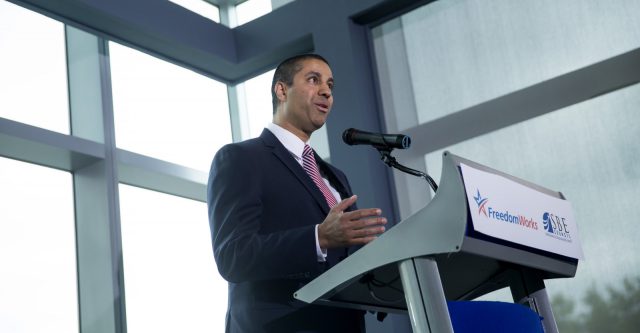
Sock Puppets: Ostensibly “independent” people quietly on the payroll of Big Telecom companies and advocating their positions.
A mass of guest editorials and opinion pieces appearing in the D.C. press praising FCC chairman Ajit Pai and his intention to get rid of Net Neutrality fail to disclose the millions of dollars the authors’ host organizations have received from the telecommunications industry.
Pai smugly announced in an April 26 speech that he wants to roll back Net Neutrality rules brought into effect under President Obama in 2015. Those rules guarantee that ISPs cannot discriminate against any online application or service or interfere with traffic for competitive reasons. Pai and other opponents of an open internet have called Net Neutrality ‘a solution in search of a problem.’ But since announcing an intention to mothball the rules, the telecom industry’s sock puppets have frantically penned opinion pieces that suggest the rules were a disaster that held back innovation and investment — a claim countered by the record of ISP investment since the rules took effect and statements from many Silicon Valley innovators that support the Net Neutrality rules now under threat.
Media Matters did extensive research on the individuals and groups behind the letters, and it will come to no surprise to Stop the Cap! readers that just about every piece originated from or on behalf of a group that received financial support from the same cable and phone companies that want Net Neutrality dead and buried:
(Searches were conducted via The Center for Public Integrity’s Nonprofit Network tool of available IRS filings.)
- Thomas M. Lenard, a senior fellow and president emeritus at the Technology Policy Institute, wrote an April 28 opinion piece for The Hill which praised Pai and defended ISPs against concerns over content blocking. Lenard’s group states that its supporters include AT&T, Charter, Comcast, and NCTA. The group received $1 million from NCTA from 2011-2014 and $22,500 from CTIA in 2011 and 2013.
- Institute for Policy Innovation (IPI) President Tom Giovanetti wrote an April 27 opinion piece for The Hill praising Pai for “eliminating harmful regulation” and commending his “commitment to undo the two-year-old mistake of regulating the internet under the old Title II.” IPI received $135,000 between 2010 and 2014 (the most recent years available) from MyWireless.org (now ACTwireless), a project of CTIA, and $110,000 from NCTA from 2011-2014.
- Digital Liberty Executive Director Katie McAuliffe wrote an April 27 piece for The Daily Caller praising Pai’s Net Neutrality remarks. Digital Liberty is a project of Americans for Tax Reform, which received $200,000 from NCTA from 2011-2014 and $115,000 from MyWireless.org from 2010-2014.
- Doug Brake, a senior telecommunications policy analyst at the Information Technology and Innovation Foundation (ITIF), wrote an April 27 opinion piece for The Hill praising Pai for “moving in the right direction” with his Net Neutrality plans. The ITIF has received $220,000 from NCTA from 2010 to 2014 and $235,000 from CTIA from 2010 to 2014.
- Brandon Arnold, the executive vice president at the National Taxpayers Union, wrote an April 26 Washington Examiner piece that criticized existing Net Neutrality rules as having “stymied innovation and reduced the deployment of new broadband services.” The National Taxpayers Union received $200,000 from CTIA from 2010-2014.
- Jonathon Paul Hauenschild, director of the American Legislative Exchange Council’s (ALEC) Task Force on Communications & Technology, wrote an April 28 piece for The Hill attacking the Obama administration’s Net Neutrality rules. ALEC has close ties to the telecom industry (among many other corporate interests) and received $85,000 from CTIA from 2010-2014 and $41,000 from NCTA in 2010 and 2011.
Media Matters previously documented that media outlets have promoted the anti-Net Neutrality Free State Foundation without noting it has received heavily financial backing from the telecommunications industry.


 Subscribe
Subscribe





